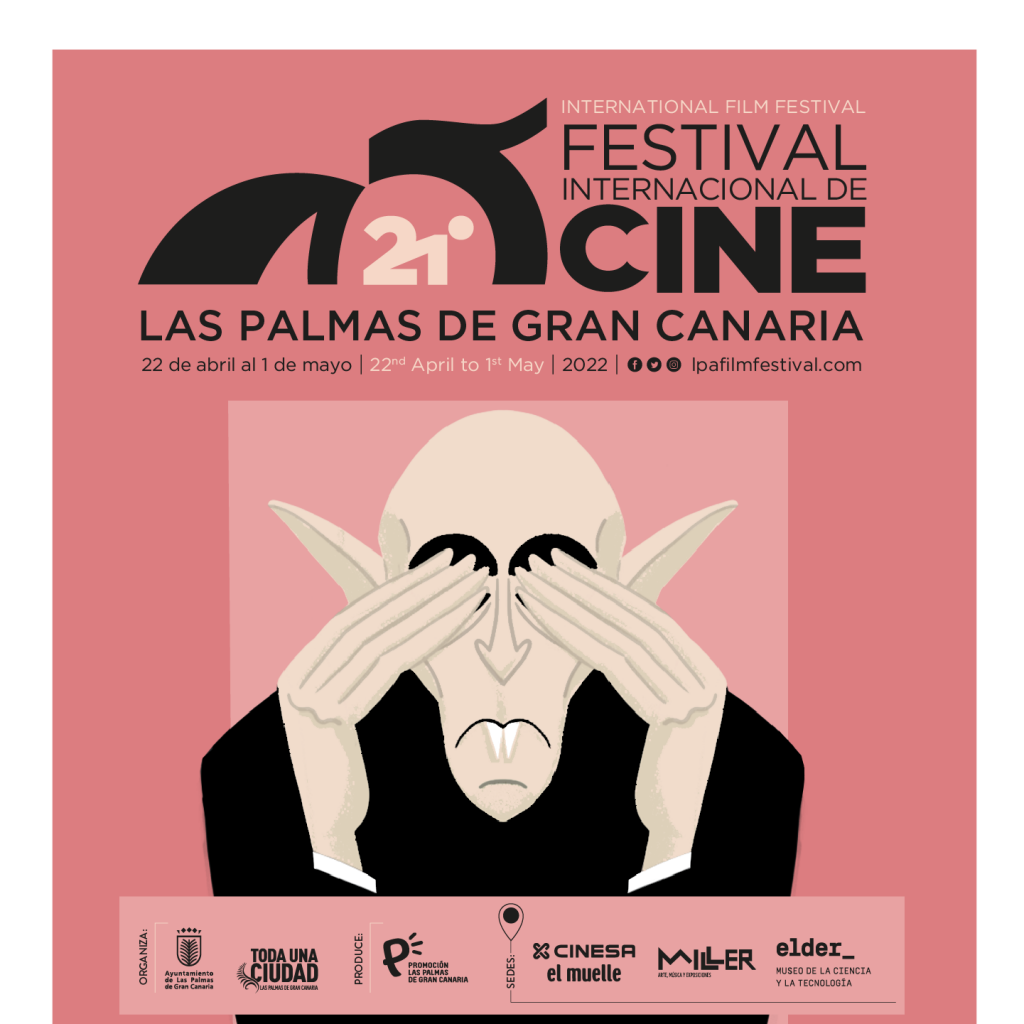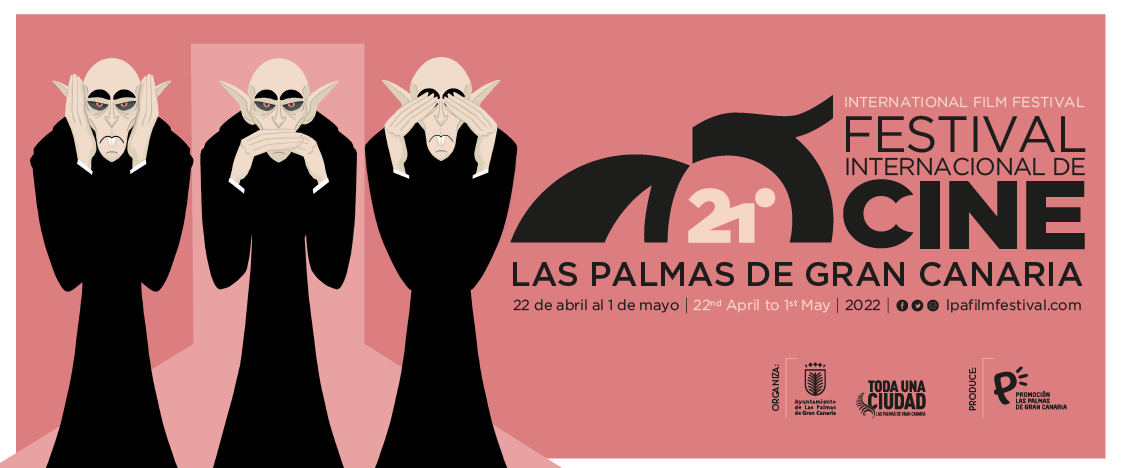Friedrich Wilhelm Murnau’s work will be strongly present at the Festival: in addition to opening the event, it will be part of Camera Obscura’s second edition (silent cinema screenings with live music) as well as the main feature of this edition’s poster
The second screening of the film will be accompanied by live music performed by the International Bach Festival, one of the ensembles that, along with maestro Jonay Armas and virtuoso Carlos Oramas, will conduct the rest of Camera Obscura sessions: two further famous centenaries with which the Festival intends to celebrate the founding of non-fiction cinema and an essential piece of silent cinema

Las Palmas de Gran Canaria, Wednesday 23 March 2022.- The Las Palmas de Gran Canaria International Film Festival will open its 21st edition with the special screening of Nosferatu, Friedrich Wilhelm Murnau’s greatest success, whose premiere took place on March 4th, 1922. The iconic vampire will light up the room accompanied by live music performed by renowned Jozef van Wissem, a Dutch lute player based in Brooklyn. Furthermore, it will be one of the silent films that, with musical arrangements performed by different bands, make up Camera Obscura, as well as the absolute protagonist of this edition’s poster, a version in which the three wise monkeys are replaced by three vampires. All within the commemoration of the centenary of the film’s premiere in Berlin.
With this decision, the Gran-Canarian festival takes on the challenge of offering the audience an experience that celebrates cinema without the connotations the red carpet implies. The film will be included in Camera Obscura’s second edition, which will revolve around the founding of documentary cinema with the selection of two other centenarian titles: Nanook of the North, by Robert Flaherty, and one of the Kino-Pravda’s 23 newsreels —the thirteenth— by Dziga Vertov, Elizaveta Svilova and Mikhail Kaufman, released in June, 1922. For both films the Festival has worked with maestro Jonay Armas, who will be accompanied by Carolina Hernández and Juan Carlos Trujillo.
Camera Obscura also recovers The Passion of Joan of Arc, released by Carl Theodor Dreyer in 1928. It will be shown with its soundtrack arranged by Carlos Oramas, an expert in historical instruments who will be accompanied by Adrián Linares and Diego Pérez.
The Film Festival will remember, too, the centenary of this iconic vampire’s birth with a variation of the allegory which, since 2016, serves as an attraction and visual riddle on the poster: the wise monkeys. Thus, without abandoning those primates that refrain from looking, listening or speaking, an ironic synthesis of what is offered within the Festival’s different spheres, the poster uses their graphical design to transfer the wise monkeys’ gestures to these three Nosferatus who accept the role of not looking, not listening and not speaking, respectively. The poster contains Patricia Díaz’s illustrations adapted by Promedia Comunicación, which is under the direction of Promoción de la Ciudad de Las Palmas de Gran Canaria’s Marketing Team.
As previously stated, Camera Obscura will be the one in charge of opening, oficially, the Film Festival. “The first vampire in cinema history…”, declares writer and film critic Jesús Palacios in the catalogue, where he also quotes Albin Grau, the producer of “an erotic-spiritist-ocultist film”. In addition to opening the Film Festival, Nosferatu will open the Camera Obscura section, too.
On April 22, the music will be in the hands of composer and lute player Jozef van Wissen, a regular of New York’s rock venues. This musician, whose look resembles that of a Metal lord, not only experiments with chords and frees his lute from chains and limitations, but also invites his listeners to forget the musical standards they are accustomed to.
Van Wissem’s ties with cinema and art are varied. This author has worked with Jim Jarmusch creating the soundtrack for some of his films or accompanying the filmmaker in his musical facet —they have edited three albums together— and has won a Best Soundtrack Award at Cannes for the film Only Lovers Left Alive (2013). He has composed, too, some pieces for certain works of art in collaboration with the National Gallery and the Hermitage Museum.
Nosferatu’s second screening, a free adaptation (and not admitted as such) of Bram Stoker’s Dracula, will be accompanied by musicians from the International Bach Festival Canarias, who will recreate the original score Murnau requested Hans Erdmann for the film. The filmmaker, who was musically educated as well as aware of the importance of this aspect as a determining feature for his work’s success, stressed the supporting role of music to the film’s dramatic effects. IBF will play this symphonic feature for the Film Festival.
Camera Obscura’s other titles
Camera Obscura’s journey will take the audience to two further essential titles which are reaching, too, their first centenary: Nanook of the North and Kino-Pravda (cinema verité). The former was made by Robert Flaherty, father of documentary cinema, and the latter was one of the 23 newsreels made by Dziga Vertov, Elizaveta Svilova and Mikhail Kaufman. Sound, in both cases, will be provided by Jonay Armas, a virtuoso who, as he himself states in the catalogue, faces the task with “a different distancing and fondness” because “this is not the film’s original soundtrack, but a revision we make a century later, from a sensitivity and a way of looking marked by our present time”. Armas will be accompanied by Carolina Hernández and Juan Carlos Trujillo.
Thus, the double program will show Nanook of the North, a work preserved by the National Film Registry and considered “culturally, historically and aesthetically significant” by the Library of Congress (USA) which, according to its author, intended to “portray the ancient majestic character of these people while it was still possible, before the white man destroyed not only their culture, but the village itself”. It will show, too, Kino-Pravda Nº13, the special number of Vertov’s “filmed magazine”, a “special, longer and more ambitious number than previous editions, conceived to celebrate October Revolution’s fifth anniversary”, points out Antonio Weinrichter in this edition’s catalogue. Both propose, within the framework of the Festival, a celebration of the founding of documentary cinema or, as musician Jonay Armas declares, “two antagonistic ways of approaching the documentary form”.
Furthermore, the Las Palmas de Gran Canaria International Film Festival will show a restored version (made by L. Gaumont under the French CNC) of The Passion of Joan of Arc, an exquisite piece, according to film critics, and “a symphony of close-up faces marked by intertitles”, as Luis Miranda points out in this edition’s catalogue. It will be screened within Camera Obscura accompanied by Carlos Oramas‘ music, an expert on historical stringed instruments who will lead a trio formed by himself on the theorbo and the Renaissance lute, Adrián Linares on the Baroque violin and Diego Pérez on the Baroque cello.
Share this Post

